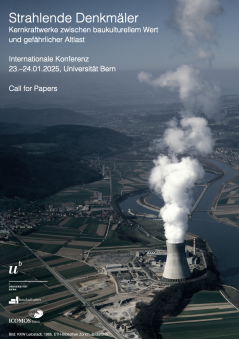From the 1950s onwards, nuclear power plants were built around the world. The advent of the “nuclear age” promised technical progress and a better future for humanity, thanks to the supply of clean, safe energy in seemingly unlimited quantities. With their domes and cooling towers, nuclear plants‘ iconic structures have always symbolized the tension between the threats and promises of the new technology, and later became the symbolic image of an anti-nuclear movement warning of the negative effects on mankind and the environment. Even today, these infrastructures are at the heart of emotional political and social debates. In the context of discussions on energy transition and the abandonment of nuclear power, questions are currently being asked about the future of nuclear power plant buildings in Europe, positioning them between sites of contamination and places of remembrance. While in Sweden, the 1980s legislation on phasing out nuclear power was recently repealed and the construction of new nuclear power plants is now planned, in Germany, the last remaining nuclear power plants were decommissioned in 2023.
After the Fukushima nuclear accident in 2011, the Swiss Federal Council and the Swiss population decided to progressively phase out nuclear energy. In 2019, the Mühleberg nuclear power plant near Bern was disconnected from the grid after 47 years of operation as a first step in this process and will be completely dismantled by 2034. Today, three sites still house four reactors: Beznau with its two power plants, Gösgen and Leibstadt. The turbine cavern of the abandoned experimental reactor at Lucens in the canton of Vaud was converted into a repository for cultural property in 1997, and has thus been preserved to this day as a monument to the nuclear era. In view of these developments, questions arise as to the cultural, historical and architectural significance of these infrastructures bearing witness to a controversial and still unfinished chapter in the history of energy. This context makes it all the more urgent to launch a debate in Switzerland and Europe on the buildings of the nuclear age, taking into account international debates in the fields of science, heritage conservation and energy.
On January 23 and 24, 2025, the University of Bern will host a conference on the building culture of nuclear power plants. We cordially invite researchers from various disciplines with a link to the building cultures and architectural histories of nuclear power plants to submit a 20-minute paper followed by discussion. Areas of specialization include, but are not limited to: architectural and art history, heritage conservation, architecture, urban planning, energy humanities and sociology.
The following topics are of particular interest:
- The atomic age: architectural histories of nuclear power buildings and sites in Switzerland and Europe.
- Iconography, imagery and perception of nuclear power plants: What images have been published in which types of media in connection with nuclear power, and how have they been received?
- Cultural significance of nuclear-era buildings, their heritage value and the possibility of listing for preservation: architectural, urbanistic and landscape qualities of nuclear power plants and their territorial networks; impact of infrastructures on the built environment.
- Visions for the future in the post-nuclear era: strategies for preserving and re-purposing buildings from the nuclear era, examples of best practices from preserved or re-purposed sites; comparisons with strategies for preserving and re-purposing related building types (gasometers, heavy industry facilities, etc.).
Interested parties are asked to submit an abstract (maximum one page) and a brief curriculum vitae (in 1 PDF) by e-mail to info@baukulturen-schweiz.ch by September 8, 2024. Contributions in English, French, German and Italian are welcome. The colloquium is organized by the association Baukulturen der Schweiz (Building Cultures in Switzerland) and the Institute of Art History (Department of Architectural History and Preservation) of the University of Bern, in partnership with ICOMOS Suisse. The symposium will take place at the University of Bern and a visit to the Mühleberg nuclear power plant is planned (limited number of participants).
Veranstaltungsort
Kontakt
Zusätzliche Informationen
Kosten
